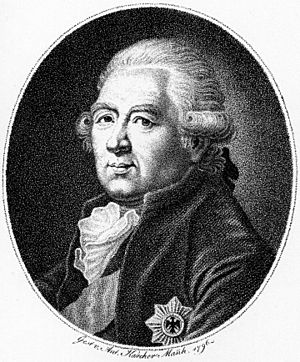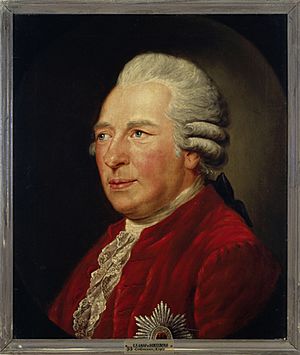Ewald Friedrich von Hertzberg facts for kids
Quick facts for kids
Ewald Friedrich, Graf von Hertzberg
|
|
|---|---|
 |
|
| Born | 2 September 1725 Lottin
|
| Died | 22 May 1795 (aged 69) |
| Nationality | Prussian |
| Occupation | Administrative/government official |
| Years active | 1745–1791 |
Ewald Friedrich Graf von Hertzberg (born September 2, 1725 – died May 22, 1795) was an important Prussian statesman. He played a big role in Prussia's government and foreign policy for over 40 years.
Contents
Ewald Friedrich von Hertzberg: A Prussian Statesman
His Early Life and Education
Ewald Friedrich von Hertzberg came from a noble family in Pomerania. He was born in Lottin, which is now part of Okonek.
When he was young, he studied classics and history. In 1742, he went to the university of Halle to study jurisprudence, which is the study of law. He became a doctor of laws in 1745. He was also very interested in history and philosophy.
After finishing his studies, Hertzberg started working for the government. He first worked with state records. Later, he moved to the foreign office, which handles relations with other countries. By 1763, he became a chief minister, a very important position. In 1752, he married Baroness Marie von Knyphausen. They had a happy marriage, but no children.
A Key Player in Prussian Politics
For more than 40 years, Hertzberg was a key figure in Prussia's foreign office. He had a major influence on Prussia's plans and actions. He worked closely with two kings: Frederick the Great and his successor, Frederick William II.
Helping Prussia During Wartime
At the start of the Seven Years' War in 1756, Hertzberg wrote papers to explain Prussia's side in the conflict. He used secret documents to show why Prussia was acting against the plans of Austria.
After a big defeat in 1757, he quickly went to Pomerania. His job was to organize defenses and gather troops to protect important fortresses. He also helped with peace talks with Sweden that same year.
He was very important in reaching the peace of Hubertsburg in 1763. This peace treaty ended the Seven Years' War. King Frederick the Great praised him, saying he made peace as well as the king made war.
Important Treaties and Alliances
Hertzberg continued to be very active in foreign policy during Frederick the Great's later years. In 1772, he wrote a detailed paper defending Prussia's claims to parts of Poland. He also helped with talks about the War of the Bavarian Succession in 1778 and the Treaty of Teschen in 1779.
In 1784, he wrote about the Fürstenbund, which was an alliance of German princes led by Prussia. Hertzberg supported this alliance to help reform the German Empire. He wanted to prevent Austria from gaining too much power.
Working with Two Kings
Under King Frederick William II, Hertzberg's position remained strong at first. The king even made him a count in 1786. Hertzberg's main goals stayed the same: he wanted Prussia to be strong against Austria and to have the support of England.
In 1787, Hertzberg played a big part in Prussia's decision to help the stadtholder William V in the Netherlands. This was a big success for Hertzberg.
However, differences started to grow between Hertzberg and the new king. Hertzberg wanted to gain more land for Prussia through peaceful talks, especially Danzig and Thorn. He hoped to do this while Austria was busy fighting Turkey. But the king sometimes wanted to go to war with Austria, which was different from Hertzberg's peaceful approach.
They also disagreed on Poland. Hertzberg did not want to see the Polish kingdom completely disappear. These disagreements became very clear during meetings in 1790. Hertzberg was dismissed from his job on July 5, 1791. He tried to stay involved in foreign affairs, but the king became more and more hostile towards him.
His Love for Learning and Writing
Even after his dismissal, Hertzberg found comfort in learning. He was one of the most educated Prussian ministers. As a member of the Berlin Academy, and later its leader, he did a lot for the world of learning.
His yearly reports for the academy covered history, statistics, and political science. One interesting report from 1784 discussed different forms of government. He argued for a limited monarchy, where the king's power is not absolute, and supported giving peasants the right to be represented in the government.
He also worked to make the academy more German, as it had been very French in its focus. He was interested in old German language and literature. He helped set up a special group at the academy to create a German grammar and dictionary. He also supported German writers and historians.
What He Wrote
- Mémoires de l'Académie (starting 1780): These books contain Hertzberg's speeches and reports.
- Recueil des déductions, &c., qui ont été rédigés ... pour la cour de Prusse par le ministre (3 volumes, 1789–1795): A collection of his official papers.
- "Autobiographical Sketch": A short story about his own life.
Later Years and Legacy
Hertzberg was known for being frank and honest. While this might not have always made him a successful diplomat, many of his ideas and goals were later proven right by history. He was honored in Prussia for his contributions.
He passed away in Berlin on May 22, 1795. He was buried in his family tomb at Schloss Britz.
Special Recognitions
- 1789 – He was chosen as a Fellow of the Royal Society, a very respected scientific group.
- 1794 – A type of sea catfish, Sciades herzbergii, was named after him by a scientist named Marcus Elieser Bloch.
 | Aurelia Browder |
 | Nannie Helen Burroughs |
 | Michelle Alexander |


